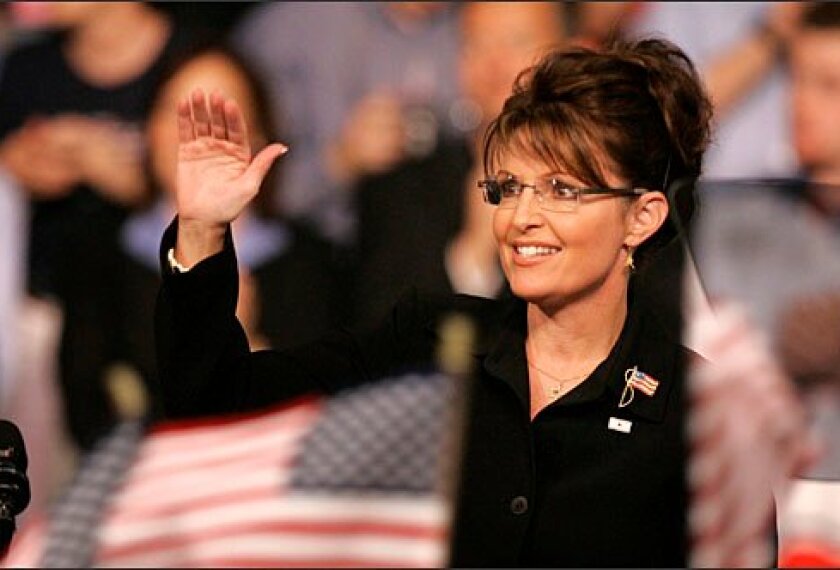In tapping Alaska Gov. Sarah Palin as his running mate, presumed Republican presidential nominee John McCain has selected an elected official who has supported increased funding for education across her rural, frontier state and voiced support for school-choice programs that appeal to many conservatives.
A mother of five children, Ms. Palin, 44, vaults onto the national stage as the vice presidential nominee from relative obscurity, at least within the political and education circles of the nation’s capital.
The Republican governor was elected to that post less than two years ago. Before that, she was the mayor of Wasilla, a suburb of Anchorage, which is the state’s largest city.
Members of education organizations in Alaska generally spoke favorably about Ms. Palin’s record on school issues since she took office in January of 2007. The governor has become a popular figure among the 13,000 members of the Alaska National Education Association, said Barbara Angaiak, president of the state affiliate of the National Education Association.
The union official credited Ms. Palin for having backed a legislative proposal, which became law this year, that overhauled the state’s school funding system. That plan brought more money to the state’s many rural and remote school districts and raised spending for students with special needs. (“Alaska Legislators Overhaul Funding,” April 30, 2008.)
The measure raised per-pupil funding by $100, to $5,480, and brought the state’s total K-12 budget to $1.2 billion.
“She understands many of the issues that are important to educators in Alaska,” Ms. Angaiak said. “She pushed fairly hard on funding, and we were pleased she was pushing.”
Supports Performance Pay
Alaska has one of the nation’s most unusual performance-incentive programs, which rewards school employees with payments for gains in student achievement. The state-run program is distinct in that it includes many different kinds of employees, from administrators and teachers to custodians and secretaries, offering them payments for increased student performance at their school.

For the latest developments from the Republican National Convention, read .
The program was initially signed into law by the previous governor, Republican Frank H. Murkowski, as a three-year pilot program, though Ms. Palin has been supportive of it, said Eric Fry, a spokesman for the state’s department of education and early development.
Ms. Palin campaigned as a supporter of school-choice programs, though a number of Alaska education observers said they could not cite examples of her having shepherded policies in that area into law. Alaska, partly because it has so many rural schools scattered across formidable terrain, has a well-established tradition of allowing homeschool programs, which Ms. Palin has supported, Mr. Fry noted.
“There is awesome potential to improve education, respect good teachers, and embrace choice for parents,” Ms. Palin told lawmakers in her state-of-the-state address earlier this year. “This potential will prime Alaska to compete in a global economy that is so competitive it will blow us away if we are not prepared.”
Supports Flexibility on NCLB
Ms. Palin has also become known for juggling her duties as Alaska’s chief executive with those of a parent. Well into her term as governor, she announced that she was pregnant, and in April, she gave birth to a son, Trig Paxson Van Palin, who has Down syndrome. The governor was reportedly back at work days after the boy was born. She and her husband, Todd, have four other children.
Since taking office, Ms. Palin has been generally supportive of the goals of the No Child Left Behind Act, though she has also backed Alaska’s efforts to gain more flexibility under the federal law, a number of observers said. Alaska officials have said that meeting the law’s mandates has been difficult, particularly in the state’s more remote districts.
The Alaska governor’s experience with the NCLB law appeared to reflect that of a particular constituency of policymakers on education, said Michael J. Petrilli, the vice president for national programs and policy at the Washington office of the Thomas B. Fordham Foundation.
“Her instincts are going to come from rural America,” Mr. Petrilli said. “It’s hard to find a state that is less of a fit for No Child Left Behind” than Alaska, he added.
The relatively short amount of time Ms. Palin has spent in office made it difficult to predict the education views she would bring to a McCain administration, said Tom Toch, a co-director of Education Sector, a Washington think tank. But he suspected that Ms. Palin’s policy-shaping role on school issues would be a small one.
“There’s not much to suggest that she would be likely to put forward any serious discussion of school reform issues,” Mr. Toch said. Generally speaking, on education, “there doesn’t seem to be a whole lot there.”
Ms. Palin’s rise to the governor’s position was sudden. After serving as mayor of Wasilla, she easily defeated then-Gov. Murkowski, in the 2006 Republican primary, before beating Democrat Tony Knowles, himself a former Alaska governor, in the general election.
As a candidate, Ms. Palin reportedly did weigh in on an issue that has stoked enormous controversy, not to mention legal action, in states and school districts. During a televised debates for governor, she said she thought creationism, the Biblically based view that God created the universe, should be taught alongside evolution in public classrooms, according to the Anchorage Daily News.
Such proposals are strongly opposed by the vast majority of scientists, who say so-called alternatives to evolution are inherently unscientific, and mislead students.
“Teach both,” Ms. Palin was quoted as saying during the debate. “You know, don’t be afraid of information. Healthy debate is important, and I am a proponent of teaching both.”
Ms. Palin told the newspaper at the time, however, that she would not push to add creationist views to the state school curriculum. Mr. Fry said the governor had not supported any such proposal during her time in office.







